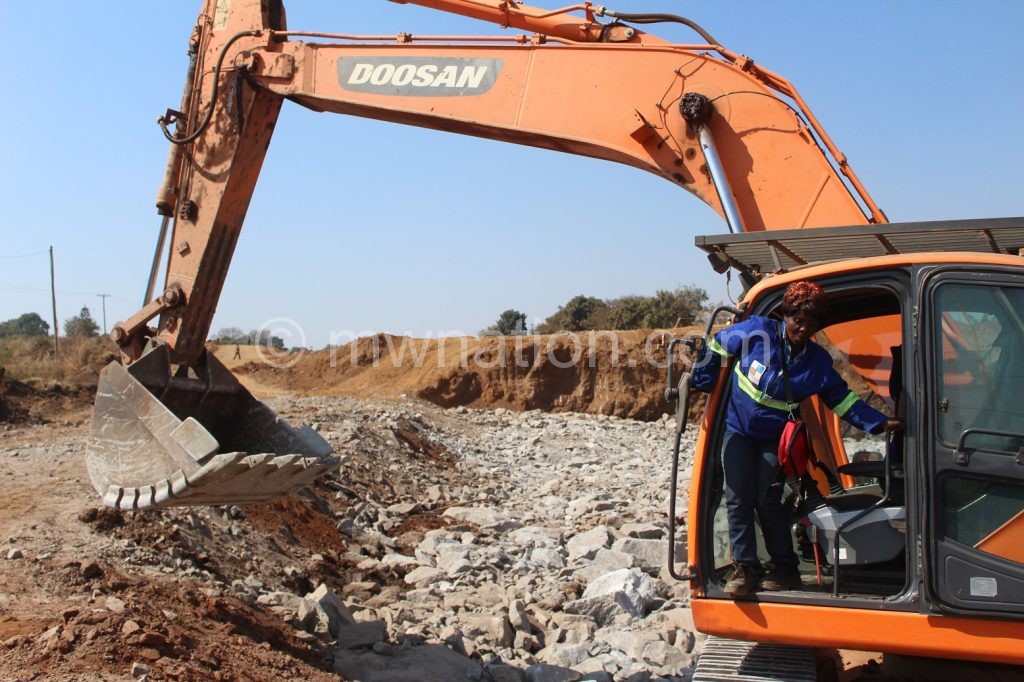A woman behind an excavator
Sights of women behind wheels are now common, even in Saudi Arabia.
But it is rare and fascinating to see one behind the grouser pad of an excavator.

The story of Priscilla Mwapasa, 41. She represents significant strides Malawi is making in breaking gender barriers in various socio-economic activities.
For women, it has not been easy to break into the male dominated jobs, including operating heavy machinery, articulated trucks, tippers or buses.
But Mwapasa is excelling in a territory long deemed as a preserve of men.
She works for Mota-Engil Engenharia, who are upgrading the Area 49-Area18-Parliament Roundabout dual carriageway.
Her urge to venture into the male-dominated job started when she was a young girl at Blantyre Primary School, says Mwapasa.
“I was always encouraged when I saw men operating heavy machines. Since then, I always wanted to join them,” she explains.
Mwapasa went to Chiradzulu Secondary School.
She grew up in a family of two boys and four girls.
She reckons her choice of friends may have contributed to her career.
“As a young girl, I used to hang around with boys more often than with fellow girls,” she recalls.
Mwapasa’s father, now deceased, never approved of her affinity for boys.
“I remember one day, he got so furious. But I never changed. Maybe this was the beginning of my journey to this current work,” she says.
Mwapasa first worked as a driver at Unitrans, a transport company working in Illovo Sugar’s cane fields of Nchalo, in Chikwawa.
In 2004, an opportunity arose at Unitrans for female employees to go to South Africa for training in operating heavy machinery.
Mwapasa was among the best performers as an excavator operator.
“My ambition continued to grow. Later, I ventured into other heavy machinery, including drum rollers and tippers,” says the woman who lives in Area 25, Lilongwe.
Her day starts as early as 5am.
“When I wake up, I pray and then do household chores, including making packed lunch for my nine-year-old son, Brian,” says the single mother.
Operating heavy machinery is not an easy job, but Mwapasa seems to have mastered it well.
On a busy day, she fills 16 tippers with loads of soil.
Her superiors are pleased with her work rate.
“She does a good job, even better than most of her male co-workers,” says Jack Chirwa, a foreman at the construction site.
To him, Mwapasa’s output demonstrates that women have the potential to do jobs often associated with men.
Elimination of gender inequality and discrimination in employment and economic opportunities is part of the push for gender equality.
Women, Business and the Law 2018, a recent report by the World Bank, shows that 19 countries worldwide legally restrict women from working in the transport and construction sectors.
“No economy can grow to its full potential unless both women and men participate fully,” reads the report, calling for reforms to laws that restrict women’s employment.
In Malawi, the Gender Equality Act provides equal numbers and treatment of men and women in the world of work.
Ministry of Gender, Children, Disability and Social Welfare spokesperson Lucy Bandazi says government is working hard in promoting the integration of gender, especially in the public service sector.
“There is enhancement of capacity in gender integration through training of public officers at all levels,” says Bandazi.
For Mwapasa, the sky is not the limit.
She has a vision that may motivate her fellow women.
She says: “I want to become a foreman or an instructor and continue being a role model to women and young girls. We need to do away with the fear of the so-called male dominated jobs.”





